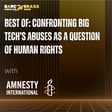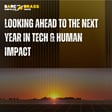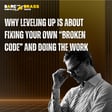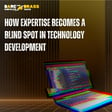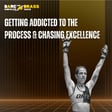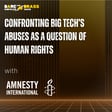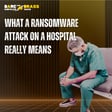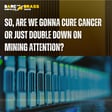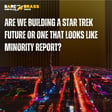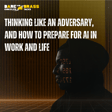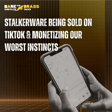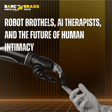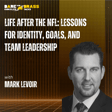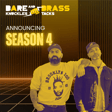Importance of Breaks and Relaxation
00:00:00
Speaker
we are there to remind each other to take a take a pause and and pull over out of the fast lane. and And because Mel is really good at that. She's really good about just kind of pulling me and aside and saying, hey, look, it's midnight. Maybe we should just go watch some Netflix. Maybe we should just, you know, yeah we should just slow down and and maybe that can wait until tomorrow.
Podcast Introduction and Guests
00:00:35
Speaker
Bare Knuckles and Brass Tax, the cybersecurity podcast that tackles the human side of cyber, buying, selling, trust, respect, and everything in between. I'm George K on the vendor side. And I'm George, a a chief information security officer.
00:00:49
Speaker
And today we are joined by the dynamic duo of Alyssa and Mel Knight of Knight Studios, Knight Coffee and generally Knight Group. These two are a powerhouse. They come as a package and it's really amazing to get time with them. We've been going
Health Scare and Interview Delay
00:01:08
Speaker
back and forth for months. You will hear Alyssa had an enormous health scare that threw everything off for a while and then Out of the blue, we had ah rescheduling and we just happened to make it work. It's just the stars align. We got them on. And this is a wide ranging discussion on life, creativity, and just, I guess what they've learned, right? It sort of it was a different it was a different conversation, but it was really rad.
00:01:33
Speaker
Yeah, I mean, it's amazing that we managed to even get them because, you know, they're so popular, they're so in demand, and they're both extremely high end individuals.
Overview of Knight Group Businesses
00:01:44
Speaker
Very, very experienced. These guys have been killing it, not only for years, but for decades.
00:01:49
Speaker
And you know they got everything going from their big corporation, Brian Thorne, our friend Carolina's in that, she's the CEO there. They have a film company, they have a video game company, they have a coffee company. yeah I have never seen entrepreneurial spirit out of a set of hackers of all things. yeah You know, these two really kind of show us the power of what people can do if they're willing to lead into their creativity. And what I like about this episode is that, you know, we kind of got away from the norm of our usual structure and we took advantage of the fact that we were dealing with two of the best creators um in the entire internet today, I would argue. And we
Introduction to Alyssa and Mel Knight
00:02:31
Speaker
got to just kind of freestyle, riff with them and jam out and kind of get their real thoughts. I think there's a lot of value to be had in this episode.
00:02:39
Speaker
Alyssa and Mel Knight, welcome to the show. Thanks George. It's good to be here. It has been many months in the planning and it all came down to a last minute text and we made it happen. Um,
Knight Group Projects and Revenue Focus
00:02:56
Speaker
so you all are doing a lot.
00:03:01
Speaker
So why don't we just check in? We do a lot. Yeah. Why don't we just check in and and can you give us an inventory of kind of the the state of things and night group, all the projects, not just the cyber, because that's going to lead into the next question.
00:03:15
Speaker
Yeah, I tend to lose um count of all the things we're doing. So I'm going to need Mel's help here. but we So Mel and I own a group of companies called Night Group under a single umbrella company. So Night Group owns an MSSP ah called Briar and Thorn. And the name not having the term the word night in it is because Briar and Thorn has actually started in 2010, so 14 years ago.
00:03:44
Speaker
ah before Night Group was even a a sparkle in our eye. And Night Group also owns Night Events, which is an events management business. We manage and run different online and physical events for yeah large credit card issuers, stuff like that. So we we we also are in the event space. We own Night Coffee, which is a coffee company.
00:04:06
Speaker
we own, which owns roastery and reserves as well. And we also have Night Studios, which is a television movie production company. but We also own, I'm forgetting one, Night Publishing, which is a publishing company. So Where we really went down this path of wanting to create really, for me, which was experiential marketing in cyber, so ah cyber themed coffee to so cyber themed television series, and bringing those all together in some form of experiential experience. All right, so the first question then is,
00:04:50
Speaker
How do you decide what to take on? Like this seems, I'm sure when we look back on it, it feels very organic. You started this thing, you started that thing, but there's also things you must say no to and just sort of trying to get a sense of how you decide. That's a really good question. I want to say it's the those, those different businesses, you know, it's, it's kind of cool because we're a project based. So a lot of the work comes in at different times. so And it's always driven by revenue. so So, you know, where some people would be like, Hey, George, I got this great idea for a company, you know, to, Hey, we have this client coming in and it's a significant amount of revenue. And they want us to build this night studios interactive, the new video game company where so that is a brand new company. Now that we've now gotten into developing AAA video games.
00:05:48
Speaker
Wait, wait, hold on a second. like I'm writing down notes here. Keep that, No company. I'm the full king. Give me a break. So yes, we're now, we've now gotten into video game development and that was driven by a very large credit card issuer coming along and saying we would like to develop a AAA video game.
00:06:13
Speaker
And now, you know, porting that to virtual reality and going through that process, ah it's a journey. It's just an ongoing journey. But our rule has always been it has to be driven by revenue. It can't just be, you know, Mel or even me going to Mel and saying, I have this great idea for a widget. It has to be driven by revenue. We always want For all of our companies, the managing the P and&L for every company is paramount in making sure that the business has revenue behind whatever idea it is that we want to make or offer. Yeah, so not all the businesses are running us 40 hours a week each 24-7. Like Alyssa said, it's revenue-based and we're really good at managing projects, so we just make everything fit in a really nice puzzle board.
00:07:12
Speaker
And Mel and I are are both ADD poster children. So we ADHD poster children. So we have We have an opportunity to be able to do something different every day we wake up. Monday, we can work on the coffee company. Tuesday, we can work on studios. Wednesday, we can work on the video game. It allows us to be able to shift our focus between all of these different passion projects and all these different things and bring the companies to a point where we bring in a CEO, it's got employees. We go to Brian and Thornton.
00:07:46
Speaker
ah the CEO of Brian Thorne, whom you've had the opportunity to meet. We heard her as a project manager. and She's now the CEO of Olive Group ah for Brian Thorne Group and its international subsidiaries. So it it's it's an opportunity to be able to take something that starts from a single idea and grow it to a point where it becomes self-sufficient. So one day being able to bring in a CEO for the coffee company, for the studios,
00:08:12
Speaker
That, I don't know if that will ever happen. i Studios are is is my baby. oh yeah It's definitely you know something where I, as you know, George's retired from cybersecurity as a practitioner a couple of years ago. Now I'm i'm exploring my my dream to have always worked in Hollywood. And now I'm a Hollywood director and we're we're making this new TV series and you know ah we're now starting a video game company. So I'm exploring the creative side
00:08:49
Speaker
that I felt I never could explore in cybersecurity. And there may be some people that may troll me for saying that because it depends on what you're doing in cyber. But I always felt as a hacker, as a penetration tester, I couldn't really do the creative things I wanted to do. I'm probably the only pen tester you'll ever meet that got excited about writing the reports. I wanted to do it in Adobe InDesign. I wanted to create this thing that looked like an $80,000 Gartner report.
00:09:18
Speaker
If you look at some of the pen test reports I've created in the past, if I could ever show them, they look like these. They're beautiful. They look like you know something you would spend you pay a lot of money for to be able to to buy and read. Which is the opposite of what really you know what red teamers or pen testers like to do. They typically like to hack. They don't like to do the presentation or the analysis or the final report.
Balancing Business and Personal Relationships
00:09:46
Speaker
I think it's kind of interesting though because you know I guess whatever we can we can speak from from personal experience in the past um I know I've tried to do businesses with like past partners of mine and um that has worked out super fun so I'm just wondering how how you guys manage. I mean, it's such a high stress environment. And not only that, like if we're just like, okay, fuck it. Listeners, this is not just a pure cyber. So we're going to talk about life. We have two really amazing people who deal with it for disclaimer. Okay. So like,
00:10:22
Speaker
You know, we're living in an era where it's really hard for um a lot of couples, especially post lockdowns, post COVID. We saw a huge spike in separation and stress and all that. I know a bunch of people that broke up and I went through a big separation last year, but you guys are like,
00:10:40
Speaker
I don't know what the word I put for it, like a ah pinnacle, an example, a beacon of like what two people can do together if they can actually get it on the same page. And, you know, there's something inherently beautiful about that. And, you know, it's like when I when I first met you guys, like what was it two years ago, two summers ago?
00:11:01
Speaker
I was absolutely blown away at all the things you were doing. And you guys were just kind of focusing on the film company at that point. And I was really, really amazed that, like, you know, listen, your hacking background just blew my mind. But then you're like you realize what the way you guys kind of approach things and the creativity, I guess, what does the ideation process look like between you two? And then how do you guys manage to balance out the egos with pride and with cohesion?
00:11:30
Speaker
Right. Because you guys don't see the my daughter his toes. Yeah. I'm, I'm, I'm not going to lie and say that it's easy. It's, it's, it's it's very hard. A lot of therapy. Um, you know, I think we have on you we have our own we each have our own therapist. We have, you know, have we've been to to marital counseling it at the end of the day.
00:11:58
Speaker
Every, I feel like there's at the root of every argument, at the root of every problem is usually misunderstandings and miscommunication, right? It's usually because of misunderstandings. Somebody didn't really understand what the other person said or somebody just didn't say it.
00:12:23
Speaker
the the best way they could have, and ah and and feelings get hurt. And Mel and I, have are I feel like we're on a journey, and in that journey has opportunities where we learn about from ourselves. we We learn more about ourselves and we learn more about each other. And I feel like the most important thing is just understanding at the end of the day and remembering at the end of the day that at some point we have to log out of our roles as
00:12:58
Speaker
co-owners of my group and and so you know I have to take off my director's hat and she's got to take off her CISO hat or whatever it is we're working on. and And remember to be wives and remember to be spouses and remember to go on dates or vacations. I just took her and surprised her by taking her to San Francisco this weekend to see Apple Park. She's always wanted to see Apple Park.
Supporting Each Other Through Health Challenges
00:13:22
Speaker
nice and you know um So I think i think you know the answer to your question is it's it's not perfect. It's a very imperfect marriage. But at the end of the day, knowing that no matter what is said and no matter no matter how it was received,
00:13:40
Speaker
you still respect the other person and you still have a fondness and love for each other that you hope is stronger than any miscommunication or miss any misunderstanding.
00:13:56
Speaker
So it's it's you know it's it's it's it's it's relationships, man. There's no perfect relationship. And yeah you know there's every relationship, whether your spouses or partners are or or friends, there's going to be problems. And it's just knowing that at the end of the day, that person next to you is your forever person. And and ah you may be angry and you may You know, ah you may not want to look at them at that moment and or be around them. But at the end of the day, knowing that you can come home and they're going to be there waiting for you. Yeah, I think it's also about showing up, you know, and understanding what everyone's specialty is. Not everyone is an expert in everything. There are some things that I'm great at. And Alyssa is like, oh, I don't want to do that, but you can go ahead and do that. And there's something that she does. And I'm just like filling each other's gaps.
00:14:50
Speaker
Yeah, so yeah we identified those things early on and I think that's what's great. We just take on certain types of roles within the companies that we are good at. It's finding each other's strengths and weaknesses and being there to sort of fly in as the hero and and and you know rescue them when they're their weakest.
00:15:11
Speaker
i'll tell you so I'll tell you a quick, you know this is kind of relevant to the question. um ah When Alyssa was really sick, you know I was taking care of her morning and night and just trying to make sure she was okay. But she still had responsibilities and projects she was that had been booked two months out. One of them was a big customer we had and she had to do a keynote and she was actually hired to be a moderator before panelists.
00:15:34
Speaker
So naturally at 6am you know because they're overseas she wakes up and she was in excruciating pain and she like literally was like I can't do this like you're gonna have to do it so I was like all right let me quickly read what I'm supposed to do and yeah see I I'd gotten up to take a shower and and I don't know what I did I just remember kind of like stretching my arm out and leaning on the wall of the shower and just remembering feeling like I had ripped open all my sutures internally. And I remember just falling to my knees and crying and she came into the bedroom, didn't know what had happened. And I'm like, you need to do this panel. And it was a, it was, you guys have to understand this was a very large event and it was for the credit card issuer that we were managing the event for. And I was, I, and she had to go in my place.
00:16:26
Speaker
And it's knowing that I could trust her and rely on her to do that, knowing that I could get back in bed and and and and recover, and that that event was going to be okay. And area that you know just it's this that trust for that the other person's got you.
00:16:47
Speaker
you know Yeah, absolutely. Well, let's dig in there a little bit. Just before
Health over Work: Alyssa's Experience
00:16:51
Speaker
we started the episode, we were talking about the health scare and you were saying something about how you'd been kind of running the engine in the red for essentially your entire working life. And, um, I think that's very true in cyber a lot of the time, not just because of incidents or stuff like that, but I'm exploring this culture in cyber. That's there's a lot of martyrdom, right? There's a lot of feeling that like we're the only ones who can do this and we'll just like Red Bull our way through this you know incident or this investigation and.
00:17:30
Speaker
You know, I was talking with a CISO who had a panic attack 48 hours after a ransomware attack had been resolved. You know, so like on paper, it's like, we're fine. We fixed it. We're back online. But that adrenaline, that cortisol is all in your system and it will find a way out. And it was like 48 hours later in the grocery store, just like.
00:17:53
Speaker
just yeah came out. But anyway, I want to give you some space to talk about that experience, what you may have learned or what you would like the listeners to take away from it. Yeah, so so this was actually, a lot happened in the couple months that I, we we literally had to shut down all the companies, like all post-production work on the TV series stopped, everything stopped, everything into a grinding hole. And so what had happened was I had gallbladder disease ah that was self-inflicted from a very rigid, very, um I,
00:18:31
Speaker
I was on keto diet for a very radical version of keto diet and and had given myself the gallbladder disease. and A lot happened over the couple months that that followed the surgery. so a Gallbladder cholecystectomy, gallbladder removal surgery is supposed to be a same-day procedure.
00:18:52
Speaker
you she should be able to just get the surgery and go home that day. I was in the hospital for five days afterwards. I got readmitted into the hospital so they could try and find out um through diagnos diagnosticians what was going on, why it was in so much pain. And in that process of them trying to figure that out, I almost died in the hospital because a nurse came into my room at night while I was sleeping and and accidentally broke the IV in my arm.
00:19:22
Speaker
And I had bled out into my bed. and had i not And had I not woken up, went out into the hallway, screamed, and then collapsed. Well, you thought you were sweating. Yeah, I thought i woke up because I thought I had sweated into my sheets. And I looked down and all my sheets were blood. I bled on my whole bed. And the doctors said that a you know a couple of minutes and i would ah I would have been dead.
00:19:45
Speaker
so you know i mean there were This was a very traumatic experience for me, filled with a lot of pain in the hospital for the during the tests, during what happened with this nurse. ah The surgeons just throwing their arms up in the air and saying, we really don't know what's wrong with you. and and to really just Finally, my doctor realizing it was shingles that had been activated as a result of the cholecystectomy.
00:20:12
Speaker
And so ah you know it was it it taught me that We, first and foremost, no matter what you are doing in your job, you must put your health first. You must take care of yourself. What you put into your engine will determine how long your engine will run before it finally just shuts off. And, and you know, I, I always, I had a terrible work life balance, um, work health balance, and it finally caught up to me. I'm 45 years old.
00:20:49
Speaker
And I was acting as if I was still in my early 20s and could eat whatever I wanted, do whatever I wanted, and there was no price to pay. But at the end of the day, we all have a price to pay. That train is never late.
00:21:15
Speaker
Alright y'all, in a total shock to both of us, this show has been nominated as Podcast of the Year for the Sands Difference Maker Awards. We're honored, we're humbled, and again, I cannot emphasize it enough, totally in shock at this turn of events.
00:21:35
Speaker
Yeah, so I'm not gonna lie to you, like, pretty amazing for a show that we came up with the idea for while we were exhausted at the end of a conference. And, you know, this, this really is just, we talk about all the time, it's just a passion project, it's just a cool thing we do, we don't get paid for it. I'm not gonna lie to you, it's after work for me, I'm probably high half the time. my half our episodes are on his nose but but somehow we've delivered value to listeners and and someone actually wants to recognize us like we have to put nice clothes on and go talk to people my well i guess we have to talk to people but yeah so yeah we curse a lot we talk
00:22:24
Speaker
Shit about a lot of things, but we're here for clarity. We're against disrespect. And again, what turned out to be more than just a sales and marketing podcast, but more of a platform to talk about what ails the industry and more importantly, what we can do to fix it. has been deeply rewarding. And so we would love to have your vote. You can check out the link in the show notes. Voting is open now until October 4th. We thank you for listening. We thank you for the time and attention that you give us each week. That's why we do the show.
00:23:02
Speaker
It's interesting because I've talked about cyber at the beginning here, but I think that's also a danger for creatives because it's hard to switch off, right? Like the creative energy can just keep going.
Balancing Creativity and Time Management
00:23:13
Speaker
And yeah I was in bands when I was younger and we would just keep going like after the gig and and you're just like buzzing. So you're just like, all right, we'll just stay up. But, you know, then you stay up till four in the morning, a couple of days in a row and then you crash and feel like hell and end up getting sick or whatever. But it's like.
00:23:31
Speaker
going back to this idea of, uh, you know, high RPM and then you're also living together as a couple. So like the boundary between the professional and the personal, I guess, how do you sort of switch it off on the standby? so you I feel like, yeah I feel like, you know, and and this kind of ties in with the other George's question. I feel like yeah we are there to remind each other.
00:24:00
Speaker
to take a take a pause and and pull over out of the fast lane. And because Mel is really good at that. She's really good about just kind of pulling men's aside and saying, hey, look, it's midnight. Maybe we should just go watch some Netflix. Maybe we should just, you know, yeah we should just slow down and and maybe that can wait until tomorrow because it is hard. You make a good point, George, especially in creative work.
00:24:30
Speaker
you're so passionate about what you're doing, it's not a job. Like when I'm you know editing this this TV show, I'm not doing a job in my mind, i'm I'm having so much fun. And it's really hard to pull away from the visual effects and pull away from the color grading and and because i'm I'm having so much fun and you lose sight of time, you lose sight of how much your body is hurting because you haven't gotten up all day.
00:24:54
Speaker
you have the sometimes the problem is sometimes the problem is also that a lot of the work is unconscious. yeah You could get up for a second and like, go eat lunch and then you have that like, oh, that's how I unlock that start because it's running in the background, right? And that's what the hardest part I find to turn off. Well, I kind of od after I've asked you guys then for advice for for the audience and even for myself on this one, because Something you guys are saying kind of strikes a really um important point with me that I've talked to George a lot about. In my experience as a CISO, I flirt with burnout on a real regular basis. I'm pretty open about that.
Dealing with Stress and Burnout
00:25:36
Speaker
um like i was in I was in Whistler last week for a conference, which is beautiful. It's like Vail, Colorado, but in Canada, it's the most beautiful thing here.
00:25:45
Speaker
And I was on a bus ride back to the airport and it was like an hour and a half. And, you know, there's a same as as you guys have a bunch of different, like more purely cyber and business specific projects going, but there's ah there's a handful of them. They're all going concurrently. I have to deliver on different stuff.
00:25:59
Speaker
And I ended up having a full-on panic attack in my seat for half the bus ride. And the person beside me was like, why were you so quiet on the ride? And I was having a panic attack. And he's like, why didn't you say anything? And he's like, you can't.
00:26:16
Speaker
like I think that's like the problem is when you're going through it, you don't want to say something because you don't want to acknowledge that something might not be right. And I think maybe, I don't know, maybe you probably might have felt similarly where it's like you're going, you're going, you're going. And there's ah there's a point where like we're doing something intense, like a very, very strict keto diet, like I've kind of been down there.
00:26:40
Speaker
Um, you reach a point where you have to decide like, am I actually hurt? Am I actually sick or am I just being solid? Am I just being weak right now? And I think that question, um, really destroys a lot of people, not only in our industry, but in society in general.
00:26:57
Speaker
How do you guys work through the mental process to finally reach the point of being like, hey, I need to stop or I need help or I just I need to unplug? that How do you guys get there? You just have to find things that are not so stressful to you because everyone's different, right? So for me, you know, I love going to YouTube and picking my favorite. Like if I know I'm stressed out because not only am I doing a night group, but I'm also a CISO for another a publicly traded company. So when I feel stressed out, I'm just like, all right, I need a breather. I'm going to go have some sparkling water, maybe take my vitamins and then go like watch something that is going to distract me from what I was doing. That's going to keep me anxious, right?
00:27:41
Speaker
And typically it, you know, or go for a walk. I mean, luckily, ah listen, I live in Vegas. So the weather is always beautiful here. Um, and typically going outside, getting some sun. Yeah. 100%. So typically for us, it's like going off all walk in the morning, mid afternoon, evening, I'm always finding things to do that. It's not staring at a screen. Um, so if I can do that, or even just talk to Alyssa, sometimes I'll just wander into her office and be like, Hey, you know, I need a break. What are you up to?
00:28:11
Speaker
And and you know it's interesting because being in a relationship, being in a marriage, whatever you're in, you ah you have to remember that each individual person operates at a different tempo.
00:28:25
Speaker
and And that's something I have to remind myself about is that I always have to remind myself that Mel does not move or operate at my same tempo. And and it's something that I have to be conscious of because while I can go, you know, 14, 16 hour days,
00:28:46
Speaker
she she really shes she's and she never groomed herself to do something like that. She has a very different definition of a typical workday than I do. um You know, I don't know if that's generational. She's a millennial, I'm a Gen Xer, but I don't know, maybe even it was it was it was even a different, it was even a different and We had different jobs. My entire life, I've always been an entrepreneur. I always had a difficulty working for an employer. To me, I always live my life by follow your dream or someone will hire you to build theirs. and you know So I have always had this entrepreneur mentality and was always building companies. So you you pushed 14, 16, 18 hour days. Whereas Mel,
00:29:33
Speaker
really sort of moved up the corporate ladder and and found success in her career through traditional means by working for companies and working for employers. So it was we we just really grew up in different circumstances in our careers. I would say being an entrepreneur is definitely a lot harder.
00:29:53
Speaker
yeah um For me, you know I learned when I turned 40, I can't operate the same way I did in my 30s. Because when i was ah you know when I was a global head at Sands Corp, running a 24-7 SOC in four different countries, I was pulling 17-hour days, seven days a week. I was living that life, I was young, I had all this energy, and I was still going out with friends ah you know in Vegas.
00:30:16
Speaker
um When I turned 40, I was just like, yikes, you know can I still do that? Even when I was a VP of a managed service company you know with 150 people under my arm, I was like still pulling that same 15, 16 hours plus traveling from LA to London to Bangalore to Toronto.
00:30:33
Speaker
and i didn't care i just worked worked worked when i started with when i started working for a group i decided to make a choice i said hey i'm not gonna work more than twelve hour days and i'm just gonna make sure i take naps throughout the day cuz i believe naps are very important you can squeeze in thirty minutes just get and you know cause you know just to kind of let your body reset. I believe resetting your body is super important for the brain. And they even say, there's even like studies from Harvard that say if you take most people that take most snaps throughout the day are more creative and more productive.
00:31:05
Speaker
but Yeah, I mean, you said something about being in front of screens. We don't talk about this enough. But when all of the input is this coming through visual, you know, ah and you're just either sitting or standing, as you said, unless it's easy to forget what you're doing, it's easy to forget that you're sort of hunching in front of the computer or you're gritting your teeth or whatever, and why it feels so good to get up.
00:31:27
Speaker
outside and whatever is because you're changing the level of input. There's a whole generation of kids that are kind of going nearsighted because everything is always the middle distance, which is just as far as the screen is from their face rather than like having to look out across a field and refocus or look close. So yeah, 100% breaking up that level of input because otherwise it's just a fire hose of light like straight into your eyeballs. Oh yeah. does It does a lot. It's crazy.
00:31:54
Speaker
Um, yeah, a hundred percent for the tempo. Sometimes I can't, I don't intend to fall asleep, but I will definitely just like lie down and do nothing for 20 minutes. And it's just like, it helps the brain kind of like wash itself and like, okay, let's get on the topic on the topic of naps. Like the idea of taking a nap in the middle of the day was such a foreign concept to me. When I met her, I was like, wait, take a nap. What what do you mean take a nap? Like we're not, we're not toddlers. What are you talking about? And.
00:32:24
Speaker
i i like I couldn't get over this. I programmed my brain to like that if you took a nap in the middle of the day, you were lazy. And you know if you didn't work on the weekends, it means I was being lazy. If you didn't work past five, it means I was being lazy. And so you know i in I'm not saying that that's in any way right, but it was just the way I i programmed my brain.
00:32:51
Speaker
and But now you do it. Yeah, but I'll take a nap now. It's all right. Maybe that just is because of my age. But, you know, I'm I'm I'm I'm definitely I don't look at it the same way anymore than I did before meeting Melissa. Every every body, everyone's body is different. Everyone's nutrition is different. So I think you just have to listen to what your body needs. That's that's why I think you don't have to eat your conventional three, four times a day. If you're hungry, you eat. If you're not hungry, don't eat. You know, make sure you stay hydrated.
00:33:22
Speaker
um you know go to a doctor annually you know like just make sure you work out um just things that take care of yourself and just listen like just like ah you know like a mechanic would on a car like listen to those and you know indications that something's wrong if the light goes on shake it in don't wait till the last minute um
00:33:41
Speaker
To Mel's credit, it reminds me, you guys are saying um there's an old army. I was in the Canadian army for a long time. There's an old army saying, when in doubt, rack out. So if we end up getting like half an hour to an hour of like unplanned time, we're racking out. In my office, I'll take a nap. If I have like a day full of calls and I have a 45 minute window. I got a pillow right here and I got my blanket over there. I'm taking a nap. and Same thing with Mel. She'd listen to her body. If she was tired, she would go and take a nap. For me, the way I grew up and the way I raised myself and and taught myself is that if I'm sleepy, it means I need to go get more coffee.
00:34:18
Speaker
you know it's yeah but what do you What do you mean taking that out of your sleep and you just get more coffee? It is interesting, right? Because it's knowledge work, it's creative work, and we don't give it the same level of attention, say, as ah weightlifting.
Staying Informed in Cybersecurity
00:34:34
Speaker
right So the level of attention that is needed in the gym If you, my greatest fear is dropping a 10 pound plate on my toes because it's a dumb ass injury that will keep me out of the gym for months, right? I've seen it happen. I've seen kids, they got earbuds in there talking to their friend and they're trying to re-rack a 45. I saw this kid drop this 45 on his foot. His shoe was filled with blood. I was like, dude, you're not coming back to the gym for six months because you just smashed all the bones in your foot, right? But this is to say,
00:35:05
Speaker
You talk to weight lifters. You got to concentrate with that bar. You got to concentrate on your breath. And then the serious folks, they are also like serious about their rest. They're seriously, but there's like just as serious about the stuff that takes place outside of the gym as the stuff inside the gym, because like that level of rest is how they like recuperate and how you. Oh, dude, I got i had a high end conditioning coach for fighting now. And the majority of the stuff he coached me on is my rest cycle. Yes, man. That's all he talks about. me when When I met Alyssa, I don't think she slept more than four hours. When I met her, I was like, I need a full eight. The idea of sleeping eight hours a night was so strange to me. I would i would i would go to sleep at like four o'clock and then wake up at eight.
00:35:56
Speaker
Oh, dude, you're a hacker. You're a hacker for sure. Nocturnal man, nocturnal. All right. ah Well, let's round to home here. So. Alyssa, you said you sort of hung up your hacker boots and, uh, Mel, you've gone full time on group, but you're still doing some CSO work occasionally. How are you staying abreast of the technical stuff? Because obviously as you work through the creative and the stories, you want them to stay relevant. You want them to stay, you know, they can't just be the, the threats and the risks of yesteryear. What's that balance like kind of flirting with the the technical part of your.
00:36:34
Speaker
quote unquote, former lives versus where you are now. Yeah, you know, here's the thing. So ah we've produced six TV series now. This is our first TV series going to major distribution, major stream. And it's still hacker genre entertainment, cyber genre entertainment, still procedural crime dramas, but around cyber genre and it in making sure that it's accurate has always been paramount to us and you know critical that we wanted it to we wanted to be able to show that a Hollywood could tell accurate tell hacking and and you know stories in an accurate way.
00:37:18
Speaker
and so Staying relevant, making sure we are aware of the latest types of exploits or ransomware or what have you. ah We use social media. you know A lot of social media is how we stay relevant with a lot of stuff still today. I may not be at the you know at the bash shell.
00:37:40
Speaker
compiling exploits or doing anything like that. But I so you know i still stay connected with what's going on. It's it's really difficult not to. you know Just because I'm a Hollywood director now doesn't mean that I'm not still connected to the same people on LinkedIn. I didn't delete my LinkedIn account and create a brand new one, I'm still connected to all the same people I used to be connected to before. So it's really hard to run from those stories or not be aware of what's hitting the headlines because I feel like we live in a different time than when I started in the early 90s, where a lot more of Main Street understands hacking now.
00:38:22
Speaker
And so you see more and more prevalence of cyber related stories in mainstream media. And so it's really difficult, I think, to hide from that, especially with social media. Yeah. And we still subscribe to the same feeds in cyber um and LinkedIn has amplified that. So you see the same post like three or four times in a day.
00:38:45
Speaker
so For better, for worse. Yeah. yeah better So you read them. And of course, you know, like Alyssa said, a lot of it's storytelling too. We see it in, you know, some of the shows we watch on Netflix, you know, the, uh, we go to, you know, we keep, we keep all the conferences.
Conclusion
00:39:00
Speaker
We still attend black hat and deaf con. So we're still exposed to a lot of the same, um, Alyssa spoke at B sides and Edmonton. That was kind of cool. We run the cyber ah events for this this credit card company, so it's really difficult to not know kind of how AI is affecting cybersecurity today. or you know We're probably the only Hollywood producers who know what a flipper zero is, and that sort of thing.
00:39:24
Speaker
Yeah, that's 100% true. Yeah, and and you know, we have one employee at group who also is studying to be like, Steve, crazy hacker. So he's always coming to us with questions and, you know, challenging us on different things. So that's keeping us on our toes. Yeah, that's true. That's street cred. I ran into him at the app sec village at Defcon.
00:39:44
Speaker
and last year, a total random. Yeah, he's awesome. Yeah. Yeah. Well, Alyssa, Mel, thank you so much for taking the time, especially right after your vacation and sharing your story. This was a blast. I'm glad we could make it happen. Thank you for having us. It's been fun. It's always always good seeing you. Thank you to the double G's. Thank you. Take care homies. All right. We'll see you soon.
00:40:10
Speaker
If you liked what you heard, be sure to share it with friends and subscribe wherever you get your podcasts for a weekly ballistic payload of snark, insights, and laughs. New episodes of Bare Knuckles and Brass Tax drop every Monday. If you're already subscribed, thank you for your support and your swagger. We'll catch you next week, but until then, stay real.
00:40:33
Speaker
we went around for months and then like it was literally on I know but I'm just saying it was literally just like oh shit someone had to reschedule can you do it Monday and you're like yeah like if that's what it took is

